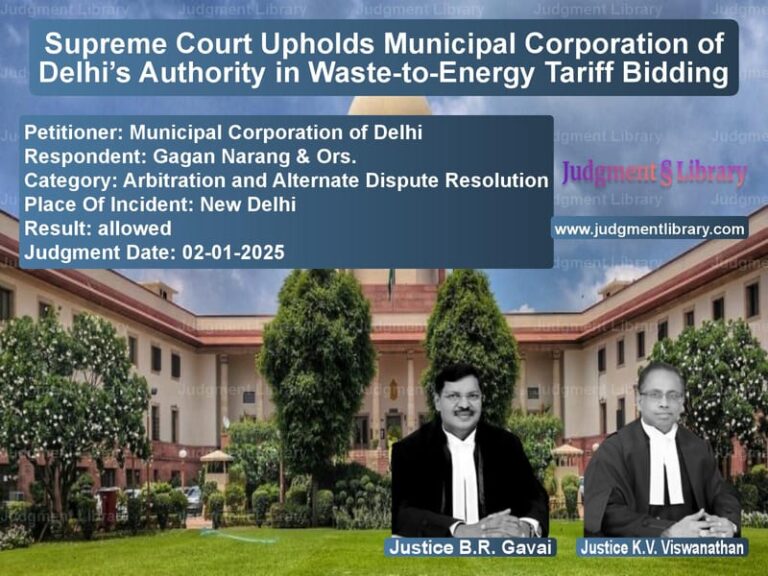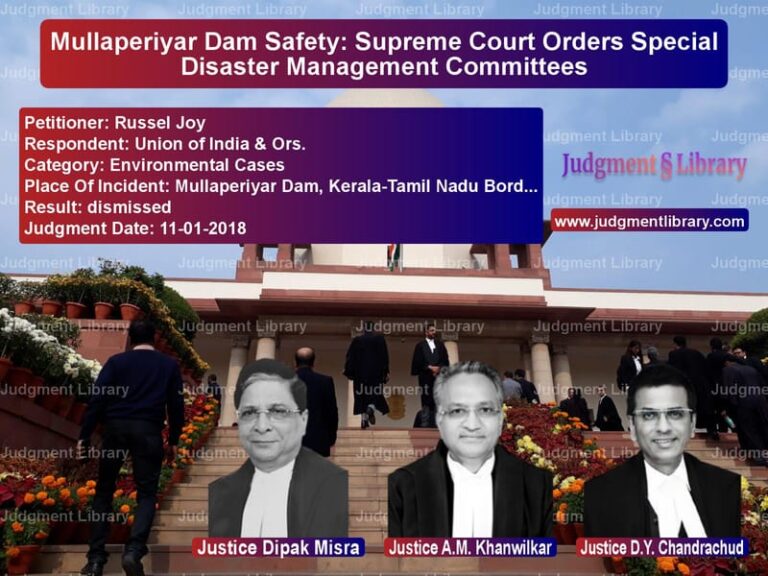Eviction and Landlord-Tenant Disputes: Supreme Court Orders Tenants to Vacate After Decades
The case of Suhel Ahmed & Others v. Haji Mohammad Ismail (D) & Others involved a long-standing landlord-tenant dispute concerning property in Lucknow. The Supreme Court was called upon to decide whether the tenants, who had remained in possession of the premises for decades, could be lawfully evicted. The case also examined the validity of eviction notices and the obligations of tenants regarding rent payments.
Background of the Case
The dispute arose over property located at Khandari Bazar Lane, Lucknow. The appellants (landlords) issued an eviction notice on May 3, 1971, demanding that the respondents (tenants) vacate the premises and pay rent arrears from January 5, 1970. The notice specified a rent of Rs. 1,000 per month.
The respondents did not comply, leading to another notice on February 5, 1974, demanding rent payment for the period from November 5, 1972, to February 5, 1974. A third notice was issued on April 15, 1974, reaffirming the earlier demands.
Subsequently, the landlords filed an eviction suit before the Additional District Judge, Lucknow, seeking possession of the premises and arrears of rent.
Petitioners’ (Landlords’) Arguments
The landlords contended that:
- The tenants had defaulted on rent payments for several years despite repeated notices.
- The tenants were illegally occupying the premises without any legal basis.
- The landlords had issued multiple eviction notices, all of which were ignored by the tenants.
- The eviction suit was validly filed in accordance with legal provisions.
Respondents’ (Tenants’) Arguments
The tenants argued that:
- The initial eviction notice dated May 3, 1971, was invalid as the landlords had later issued additional notices.
- The subsequent notices effectively nullified the first notice, making the eviction claim unenforceable.
- They had not received proper notice regarding the demand for rent arrears.
- The landlords’ claims were barred due to the delay in initiating legal proceedings.
Lower Courts’ Decisions
The trial court ruled in favor of the landlords, holding that the tenants were liable to vacate the premises and pay outstanding rent. The court found that:
- The tenants had been properly served with eviction notices.
- The delay in filing the suit did not invalidate the landlords’ claims.
- The tenants were liable to pay rent arrears along with possession of the property.
The High Court, however, overturned this decision, stating that the subsequent notices had effectively waived the landlords’ right to eviction based on the first notice.
Supreme Court’s Observations and Judgment
The Supreme Court reviewed the case, focusing on whether the first eviction notice had been waived by subsequent notices. The Court held:
“The eviction notice dated 15.04.1974 was validly served, and the tenants had knowledge of it. The claim that the first notice was nullified by later notices is legally unsustainable.”
The Court further ruled:
“Where a landlord issues multiple notices, each demanding rent arrears and eviction, it does not constitute a waiver of the previous notices. The right to eviction continues unless the landlord explicitly withdraws the claim.”
The Supreme Court set aside the High Court’s order and reinstated the eviction order of the trial court.
The tenants were granted time until September 30, 2020, to vacate the premises. The Court also directed that:
- The tenants must file an affidavit within four weeks confirming their intention to vacate.
- The tenants must pay all outstanding rent dues within eight weeks.
- In case of non-compliance, eviction orders would be enforced immediately.
Key Takeaways from the Judgment
- Validity of Multiple Eviction Notices: The ruling clarifies that issuing multiple eviction notices does not waive the landlord’s right to seek eviction.
- Obligation to Pay Rent Arrears: Tenants cannot use procedural arguments to escape liability for unpaid rent.
- Strict Enforcement of Eviction Orders: The Court ensured that eviction is not indefinitely delayed by granting a specific timeline for vacating the premises.
- Guidance for Future Cases: The judgment provides a precedent for landlord-tenant disputes, ensuring that landlords’ rights are protected.
Impact of the Judgment
- Precedent for Eviction Cases: This case sets an important precedent on how multiple eviction notices should be interpreted.
- Clear Legal Stand on Rent Defaults: The judgment reinforces the principle that tenants must comply with rent obligations and cannot indefinitely remain in possession of premises without payment.
- Timely Enforcement of Property Rights: The ruling ensures that landlords do not have to wait decades for the enforcement of their legal rights.
Conclusion
The Supreme Court’s decision in this case reaffirms the rights of landlords in eviction disputes and provides a clear legal framework for handling rent defaults. By ruling in favor of the landlords, the Court has upheld the principle that tenants cannot indefinitely occupy premises without fulfilling their legal obligations. This decision serves as a guiding precedent for future landlord-tenant cases in India.
Petitioner Name: Suhel Ahmed & Others.Respondent Name: Haji Mohammad Ismail (D) & Others.Judgment By: Justice Uday Umesh Lalit, Justice Indira Banerjee.Place Of Incident: Lucknow, Uttar Pradesh.Judgment Date: 25-09-2019.
Don’t miss out on the full details! Download the complete judgment in PDF format below and gain valuable insights instantly!
Download Judgment: Suhel Ahmed & Others vs Haji Mohammad Ismail Supreme Court of India Judgment Dated 25-09-2019.pdf
See all petitions in Landlord-Tenant Disputes
See all petitions in Property Disputes
See all petitions in Damages and Compensation
See all petitions in Judgment by Uday Umesh Lalit
See all petitions in Judgment by Indira Banerjee
See all petitions in allowed
See all petitions in Quashed
See all petitions in supreme court of India judgments September 2019
See all petitions in 2019 judgments
See all posts in Civil Cases Category
See all allowed petitions in Civil Cases Category
See all Dismissed petitions in Civil Cases Category
See all partially allowed petitions in Civil Cases Category







